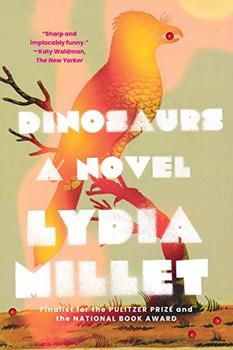Summary | Excerpt | Reading Guide | Reviews | Beyond the Book | Readalikes | Genres & Themes | Author Bio

A Novel
by Lydia MilletMOURNING
WHEN HE DECIDED to leave New York, he chose Arizona because of some drone footage he'd seen. It wove through the canyons of red-rock mountain foothills, over sage-green scrub and towering cacti with their arms outstretched. Then up into the higher elevations, where there were forests of ponderosa pine.
Sky islands, was what they called those desert mountains.
Gil was keenly aware, watching the video, that he himself would never glide over the rolling landscape with that hypnotic steadiness. Would never coast over trees as the metal bird did—close enough to see the clusters of green needles on the pine boughs dip and sway in the wind.
He was also aware of the artifice of the soaring choral music the footage was set to. No landscape came with that.
Still it captured him. The desert had an alien beauty that seemed as different as you could get, within the lower forty-eight. The opposite of Manhattan.
He recognized the pattern. He went to new places because they weren't the same as the old ones.
But he wanted to feel the distance in his bones and skin, the ground beneath his feet. Not step onto a plane and land in five hours after a whiskey and a nap.
And not drive, either, with the speed and convenience cars gave you.
He wasn't looking for easy. He had nowhere to be and no one who needed him.
On hiking websites he researched what he should carry, the weight of camping gear and water and food. He plotted his route painstakingly, spreading out paper maps on his kitchen table, checking each segment against local data from Google. The route that cut sharply south, because of the cold that would descend before too long, then straight west, along the bottom of the country from Georgia to Louisiana, through Texas and New Mexico.
Not much longer than the Appalachian Trail. Which people hiked, from beginning to end, every year. But harder in several details, since the asphalt arteries of the nation weren't designed for feet.
Then he'd sold his loft in the Flatiron District. Bought a house in Phoenix sight unseen, save for virtual tours and curated, artfully lit photos. Packed up his possessions and had movers come and take them there.
The long walk lasted for almost five months. He rested whenever his legs or back were aching—an ache that got less acute after the first couple of weeks—and stayed in motels when he could find them. The farther west he went, the greater the distances from one to the next. In Texas, even at a pace of twenty-five miles a day, sometimes four days passed between gas stations. And more than a week between motels. He had to carry a lot more water then. Ration it carefully.
Besides the weight of water and the cold, bathroom and shower availability were his most serious problems. He got rank when he had to camp out for too long—he knew this rationally, though he was mostly immune to the odor—and sometimes a front-desk clerk gave him attitude. At first glance, he looked and smelled homeless.
But his credit checked out and he cleaned up nicely.
On the walk, time moved so slowly that he ceased to measure it. It could be relentless in its tedium.
Other times the slowness seemed like grace.
At those moments, he looked back on the measured days and hours of his life in the city—its boxes and rows, its tidy compartments—and came to believe that version of time was the false one.
A grid designed, like the city itself, to keep everyone in their assigned seats.
FOR WEEKS AFTER he moved into his new house, the glass one next door was still up for sale. Curious, he'd taken a break from arranging furniture to go to a showing.
It was a mid-century-modern masterpiece, the real estate agent boasted.
Though technically, built in the nineties.
Excerpted from Dinosaurs: A Novel by Lydia Millet. Copyright © 2022 by Lydia Millet. Used with permission of the publisher, W. W. Norton & Company, Inc. All rights reserved.
Your guide toexceptional books
BookBrowse seeks out and recommends the best in contemporary fiction and nonfiction—books that not only engage and entertain but also deepen our understanding of ourselves and the world around us.